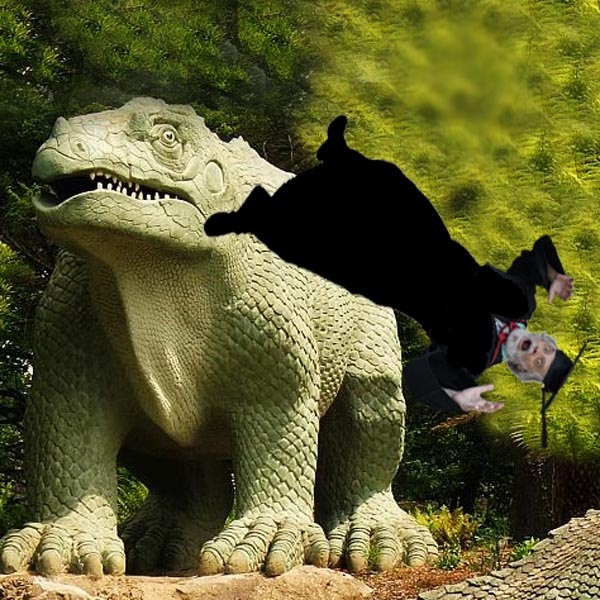 |
| "...I fell off my dinosaur!" |
Note: Like the two before and the two after, #01-003 was submitted to the Shenzhen Daily as part of my application process when I began working there in August, 2007. August in south China is HOT, and all five of my submissions were about the "warm" weather.
Get Ready: Do you always say exactly what you mean? Understatement is when we soften what we say, saying less than we really mean. Exaggeration (also called overstatement) is when we say more than what is true. Do you ever do either of these?
Bob: Phew! It's a little warm out there, isn't it?Angel: Oh, no, Bob. It is very hot.[Bob and Jay laugh]Jay: Yes, Angel, you're right. Bob was just making an understatement. Actually, it's hotter than hell out there!Bob: Well, I may have understated it, but you're exaggerating![They all laugh]
- To be funny:
A man has been hit by a car, and requires numerous surgeries to repair his injuries. When a friend asks how he is, he says, "It could have been worse." - To be modest:
The Beatles are considered by many to be the greatest rock band ever. Band member Paul McCartney once called them "a pretty good little band." - To be polite:
Someone calls a very fat person "a little overweight." - To downplay a problem caused by the speaker:
Someone has caused the company to lose a lot of money, and tells the boss, "I think I might have made a small mistake…"
- To be funny:
Someone tells an old joke and you say, "The last time I heard that, I laughed so hard I fell off my dinosaur! - To emphasize something:
"I'm starving." It means "Feed me now," not "I'm literally about to die." - To make a situation seem more dramatic:
When Bob says, "It's hotter than hell," he's comparing the weather outside to Hell, the place of fire in Western folklore where bad people go. (By the way, some people find this word unacceptable in polite company. You can also say, "Hotter than heck," or "Hotter than Hades.")
--------
Read more:
- Exaggeration: https://en.wikipedia.org/wiki/Exaggeration
- Understatement: https://en.wikipedia.org/wiki/Understatement
Practice: Look at the following sentences. Are they exaggeration (E) or understatement (U)?
- I have a million things to do today.
- He's not the smartest person I know.
- There's a bully at school, and let me just say: he's not a nice person.
- I've walked all day, and my feet are killing me!
- Bill Gates knows something about computers.
- My teacher is as old as dirt.
- William Shakespeare wasn't a bad writer.
- A woman's son wins top awards in school and she says he's "pretty smart."
- A very successful man says, "I have done OK."
- My mom is the best mom ever.
Check your answers in the first comment below. Then look as the statements again and try to figure out the speakers' purpose. Were they trying to be funny? Modest? Polite? Dramatic? To emphasize or downplay something?.
Submitted to the Shenzhen Daily for August 6, 2007
This lesson received 198 visits on my old site between December, 2011, and June, 2021.


Answers to the Practice: 1. E; 2. U; 3. U; 4. E; 5. U; 6. E; 7. U; 8. U; 9. U; 10. E
ReplyDelete